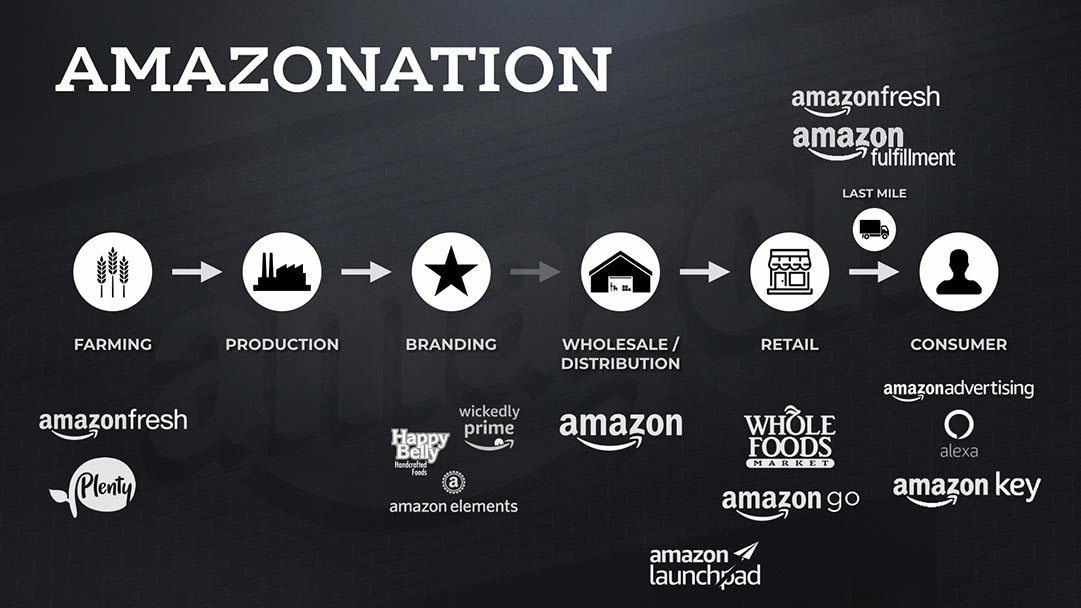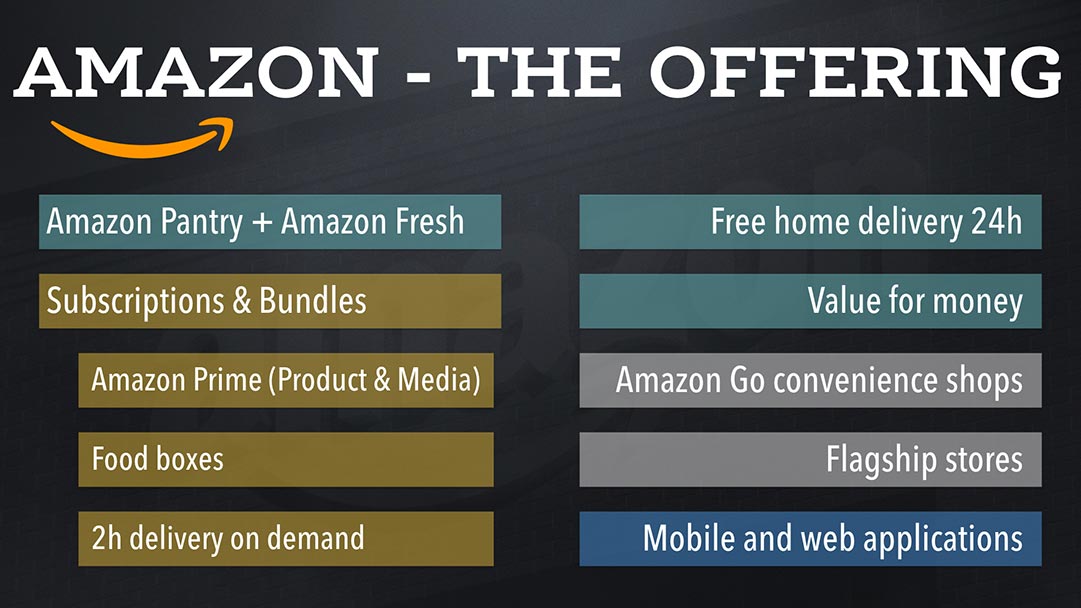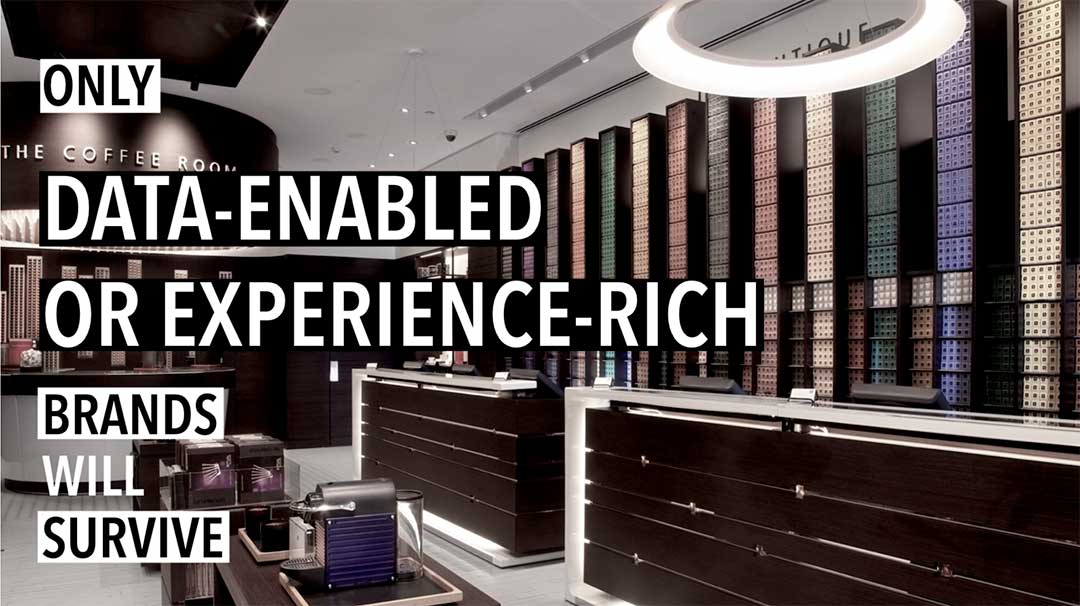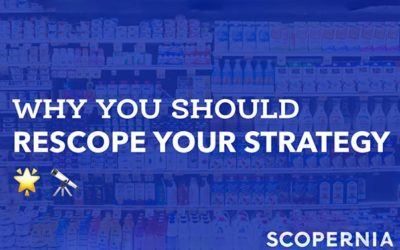What if Amazon launches a full food & drink offer in the Benelux?
Amazon will drive 50% of supermarkets into bankruptcy. Why is this a likely scenario?
Scenario planning exercises are the best way to assess and visualise possible future scenarios. Companies can only define a sharp strategic action plan when they have a clear vision of the future.

It is extremely likely that Amazon is planning an all-out entry of Belgium and The Netherlands. As we speak, the e-commerce giant is opportunistically venturing into Benelux, operating via Amazon.fr and Amazon.de. Even as likely is the prospect that Amazon will soon focus on the Food & Beverage sector, the biggest market in the world. With a huge frequency of consumption and transactions, this sector is the ideal battlefield for a data-enabled player like Amazon. Another retail behemoth, Alibaba, is eying the
European market as well. The Chinese are virtually unbeatable in implementation and roll-out speed.
“What if?”
The full ‘Amazon offer’ that would be available to a Belgian or Dutch consumer can be deduced from Amazon’s current offer in countries like the United States, India, Germany and the UK.
Apart from cloud services (AWS), which we leave out of consideration for the purpose of this article, we can be sure that the offer would include the following six services in the near future:
- Free one-day home delivery for Amazon Pantry as well as Amazon Fresh products.
- Big flagship stores that have a strong focus on experience. These shops will be equipped with state-of-the art retail technology and could possible have a restaurant-component where consumers can eat and taste. Rough estimations indicate that 40 to 60 of these stores would be sufficient to strategically cover all major Benelux cities, and thus 85% of the population.
- A fine-meshed network of smaller cashier-less convenience stores with a limited assortment, currently known as Amazon Go stores.
- Subscription formulae including media & entertainment bundles (Amazon Prime), basic replenishment products (such as water, milk, sugar…) and bundled food products (like HelloFresh’s offering). These services will be combined with optional super-fast two hour delivery.
- A colourful range of inspiration, health and nutrition apps that will help with recipe suggestions, ingredient allergies, dietary advice, seasonal products…
- Amazon Echo, better known as ‘Alexa’, will be present in many households. The use of Amazon services will be seamlessly integrated into our daily routine. Ultra-convenience and unburdening by a ‘digital butler’ will become the norm.

The bad news for today’s traditional retailers is twofold. First of all, Amazon will apply a lower price level than the market average, and maybe even claim the lowest price. This will evidently unleash a price-war with Benelux retailers like Colruyt, Jumbo and Dirk, who are currently perceived as the lowest price players.
Secondly, Amazon doesn’t have profitability goals. Instead, it only has aggressive long term growth goals to take over the retail market. Amazon is earning its profit with its cloud services and its rapidly growing advertising business.
Advertisers have aimed to focus their efforts as close to the buying decision as possible, so advertising on Amazon is increasingly becoming the logic choice. Amazon has recently surpassed Google as the biggest product-focussed search engine. As a side-effect, local media companies will be greatly affected as well when Amazon enters the market.
“So what?”
You possible wonder why we need to worry about a foreign e- commerce company taking a mere 5% market share. After all, the big retailers in the landscape have secured strong local market shares of at least 20%. So surely they are strong enough to compete with Amazon?
However the profitability of food retail is fairly low. In the Benelux, netto margins are on average 2 to 3%. Colruyt and Ahold lead the pack with the highest margins, some players score very low, sometimes even in the negative. An optimistic estimation considers that 1 in 10 supermarkets in Belgium is unprofitable. The Netherlands would score slightly better with 1 in 15 supermarkets not being profitable.
A looming price-war has an immediate and detrimental impact on profitability. The recent Dutch price-war (2003-2006) illustrates that only extremely solid retailers with deep pockets can survive such an onslaught. The most unlucky victim was the Laurus Group, which was forced to sell off its Edah and Konmar branches.
Even without a price-war, the loss of market share will bring traditional retailers to very difficult waters. The reason is the high fixed cost model of the food retail sector. To build attractive, modern, well-located stores requires a considerable investment, which only pays off if enough traffic and revenue is generated.
Fixed costs vary between 60 – 70% of revenue. Therefor, a loss of 5% market share by definition results in a loss of 3% in terms of profitability. This means that over. half of stores would become loss-making. Very few retailers have enough money in the bank to survive this situation for long. The franchisees, that deliver a significant part of turnover in many of the retail chains, might be even more prone to throw in the towel.
Retailers surely will not go down without putting on a fight. Retailers will up there game to keep consumers coming to their stores. They lure in customers with attractive promotions and invest heavily in the modernisation of their supermarkets to focus on experience and ultra-convenience. As the pressure rises, all players in the value chain will be forced to share the investment of this war plan. Farmers, branded manufacturers and private label manufacturers will all be squeezed for a hand-out in order to keep the status-quo afloat. A total war throughout the value chain will cause conflict and victims everywhere.

A-brands will be forced to invest in their brands as well. The focus of investments for them will be on experience as well as on becoming data-enabled. Only the strongest brands will be able to walk away unscathed. A future channel strategy needs to be well thought out and executed. Although brands evidently need to gather experience on the platforms of big e-commerce players, the doubt remains that betting on a dominant player like Amazon is a future proof, long-term strategy.
And will Amazon settle will only 5% market share? Another thought…
“What now?”
If you consider the scenario above to be science-fiction, you might as well stop reading here.
Ah, good to see that you are still with us. Is this scenario inevitable? Well, the tide can still be turned if one acts quickly. Amazon’s strongest differentiators today are frictionless, free home delivery and very competitive consumer price levels. Picnic and Ocado are already proving that this can be a sustainable and profitable business model. In the war for the highest customer perceived value, the three following universal rules apply:
- “The First Mover Advantage”: the first player to claim a proposition has a considerable head start.
- “Fast Follower & Performance Leader”: in rapidly changing categories, it is not necessary to be the first mover. As long as you become the best-in-class quickly and maintain that level.
- “Deny Your Competitor Any Form Of Differentiation”: if a competitor is not able to differentiate himself from the existing offering, he has outlived his relevance.
As Darwin has taught us:
It is not the strongest of the species that survives, nor the most intelligent that survives. It is the one that is most adaptable to change.

About Nils van Dam
Nils is an experienced business leader with over more than 20 years of experience at CEO level in global, regional and local roles. He has a deep knowledge of the food and beverage industry and skills in general management, digital transformation, marketing and customer development.
De 3 lessen uit de neergang van Blokker België
De 3 lessen uit de neergang van Blokker BelgiëIntroductie tot de Blokker Case Op 18 februari 2020 kopt De Tijd “Blokker trekt zich terug uit België”. De eigenaar Michiel Witteveen zei: “De jongste 5 jaar stonden de omzet en de resultaten van de Blokker-winkels in...
Re-born Duval Union Consulting becomes Scopernia
Re-born Duval Union Consulting becomes Scopernia "A new style of consulting needs a suitable name." Ghent, 18 February 2020 – The management of Duval Union Consulting announces, on behalf of CEO Nils van Dam and founders Jo Caudron and Dado Van Peteghem, that the...
Why you should rescope your strategy
Why You Should Rescope Your Strategy Summary: a video for those who do not like to read why my new book resonates with many decision-makers the need to create strategy on a higher level: from just dealing with competition in the traditional way, over following digital...



